|
|
Posted 2/1/2015 (link)
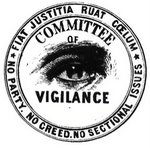 The formidable Whenever We Feel Like It reading series is back with its most recent event, recorded on October 6, 2014 at our own Kelly Writers House. As host Michelle Taransky explains, this evening's readers are not just "pretty awesome, superstar Philadelphia poets," but also poets with new books from Baltimore's Furniture Press: Ryan Eckes and Chris McCreary.
Eckes is up first, reading selections from Valu-Plus — starting with the first and second sections, "Trudges" and "Slapstick," before moving on to the last section, "Blue Books" — before moving on to newer, unpublished poems. McCreary is next, reading a wide array of poems from [ neüro / mäntic ].
Lest you need to be reminded, The Whenever We Feel Like It Reading Series is put on by Committee of Vigilance members Michelle Taransky and Emily Pettit. The Committee of Vigilance is a subdivision of Sleepy Lemur Quality Enterprises, which is the production division of The Meeteetzee Institute. You can find recordings from the series dating back to 2009 here.
Posted 2/3/2015 (link)
 Yesterday brought the exciting news that Nathaniel Mackey had won the 2015 Bollingen Prize for American Poetry. The judging committee hailed the poet's work, observing: "Nathaniel Mackey's decades-long serial work — 'Songs of the Andoumboulou' and 'Mu' — constitutes one of the most important poetic achievements of our time. 'Outer Pradesh' — jazz-inflected, outward-riding, passionately smart, open, and wise — beautifully continues this ongoing project."
Our own Al Filreis recently posted a Jacket2 commentary post, "Notes Toward Understanding Nathaniel Mackey's 'Outer Pradesh,'" which sings the praises of that recent work and situates it among the longer threads running through Mackey's writing. Here's a brief taste:
"The provincial train moving these people outward is evoked so richly and descriptively that it seems to us to be the specific memories of his characters, and, at the same time, to be the site of an allegory of psychic internal exile. The people on the train are called a 'philosophical posse' (13). The other seats on their train are empty. The train is engineless and driverless, reminding one of a modern history of U.S. writings that have sought cultural directionlessness as a bodily exciting issue of State — William Carlos Williams's driverless car at the uncontrolled ending of 'To Elsie,' a crazy moment of postmodern cultural anthropology; Robert Creeley's speaker's existential musings, at the end of a crazy drive reminded to 'watch out where you're going'; F. Scott Fitzgerald's possession-obsessed American characters crashing on the highway heading outward to Gatsby's Outer Pradesh on the North Shore."
You can read the write-up in full here, and don't forget about PennSound's Nathaniel Mackey author page, where you can listen to thirty years' worth of readings, talks, and interviews.
Posted 2/5/2015 (link)
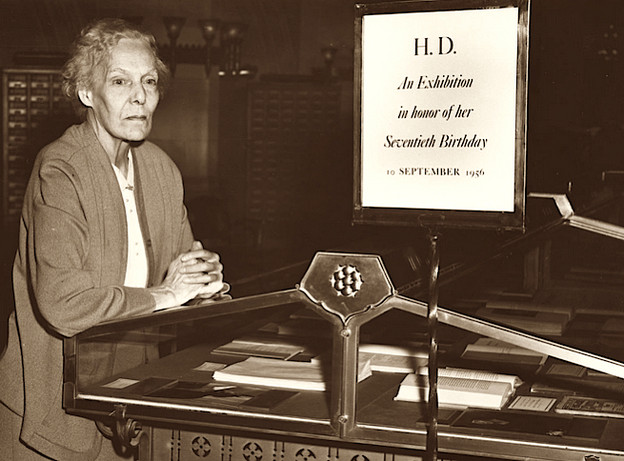 This week saw the release of 2015's first program in the PoemTalk Podcast series , the eighty-fourth in total, which is focused on Helen in Egypt by the one and only H.D. This time around, host Al Filreis was joined by a panel that included Julia Bloch, Dee Morris, and Annette Denbo.
As Filreis acknowledges at the start of his write-up on the PoemTalk blog, the panelists' mission, "to give a sense of the whole of H.D.'s lyric epic Helen in Egypt through a discussion of five selected small parts" is no small task, but rather a challenge that "pushed at the limit of PoemTalk's scope and mode." Nonetheless, "afforded an extra fifteen minutes of air time, and given what we like to think is a careful selection of poems, we hope and expect that new readers of this modernist epic — this radical revision of the Helen myth — will be intrigued enough to purchase a copy of the 304-page New Directions volume and explore further for themselves. And even those experienced with the open-ended ways of this long poem will find something new in these expert responses to each other and to Al's questions." You can read more about the five selections and also hear a bonus recording of the panelists discussing H.D.'s version of imagism (with a look in particular, toward the end, at the poem "Sheltered Garden") on Jacket2.
PoemTalk is a co-production of PennSound, the Kelly Writers House, Jacket2 and the Poetry Founddation. If you're interested in more information on the series or want to hear our archives of previous episodes, please visit the PoemTalk blog, and don't forget that you can subscribe to the series through the iTunes music store.
Posted 2/9/2015 (link)
 In addition to the seven new Cross Cultural Poetics episodes that we recently announced, CCP host Leonard Schwartz sent us something else that's very interesting: a pair of videos for episodes recorded several years back, featuring Matvei Yankelevich (shown at left) and Charles Bernstein, which were recorded at The Evergreen State College's Center for Creative and Applied Media TV Station (CCAM).
Yankelevich's video, for episode #201, "By the Sea," was recorded on October 19, 2009, and is focused on his then-latest collection, Boris by the Sea (Octopus Books). In the original program, this segment appeared alongside a discussion with novelist Bruce Benderson about his Pacific Agony.
Bernstein's appearance, for episode #208, "Bernstein and Carr," was recorded on January 5, 2010, and highlights selections from All the Whiskey in Heaven (Farrar, Straus, & Giroux), his selected poems. As the title suggests, Bernstein's segment aired alongside a discussion with Julie Carr about her book, 100 Notes on Violence.
For those well-acquainted with the program, it's a rare treat to exchange the intimacy of radio for a visual experience, though a different sort of intimacy emerges here, watching the ease with which Schwartz conducts his interviews. We'll cross our fingers and hope for more video documentation in the future.
Posted 2/11/2015 (link)
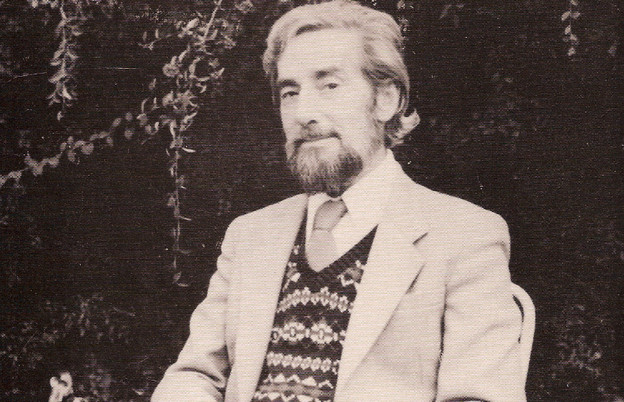 PennSound is very happy to have a comprehensive collection of recordings by the late David Bromige — many of them from the poet's own archives — thanks to the cooperation of Cecilia and Chris Bromige, David's widow and son. That collection got a little larger recently, with one new addition to the page, along with the segmentation of a previously-available recording.
Our new addition is an April 26, 1976 reading at SUNY-Buffalo, which draws upon a wide body of Bromige's work — including selections from Threads, Birds of the West, Credences of Winter, and Six of One, Half a Dozen of the Other — over the course of its seventy minutes.
You'll also want to check out Bromige's January 29, 1992 reading, also at SUNY-Buffalo, which has just been split into fifty-two individual tracks. Al Filreis recently wrote this up in a Jacket2 commentary post, noting, "The segmentations are, as I say, quite new, so if readers and listeners have suggestions for improvement or correction, please by all means pass them along to me (afilreis [at] jacket2.org) and we will apply the fix. PennSound is, to say the least, an ongoing and interactive process."
Posted 2/13/2015 (link)
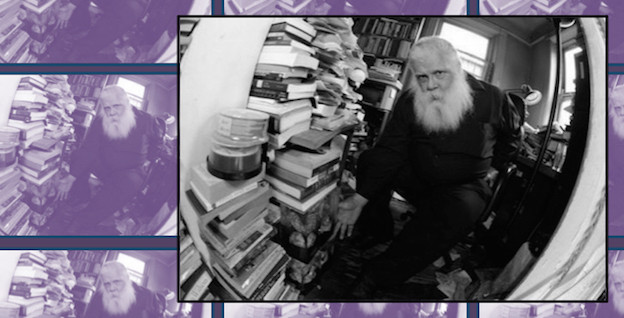 Today saw the launch of a very exciting new Jacket2 feature, "The Motion of Light: Celebrating Samuel R. Delany", edited by Tracie Morris. It takes its name from the Kelly Writers House celebration of Samuel R. Delany?s performative poetics, held on April 11, 2014, which you can listen to on PennSound's Samuel R. Delany author page.
This new feature goes beyond the confines of the day-long tribute with a diverse array of contributions — from the likes of Frank Sherlock, Fred Moten, Anne Waldman, Jena Osman, John Keene, Sarah Micklem, Kenneth R. James, and Ira Livingston — that run the gamut from remembrances to poetry to critical essays. Also included is a new transcript of Charles Bernstein's Close Listening conversation with Delany, recorded as part of the KWH event.
You can browse the feature's table of contents here, and be sure to visit ourDelany author page for audio and video from the tribute and many other recordings from the late 1960s to the present.
Posted 2/16/2015 (link)
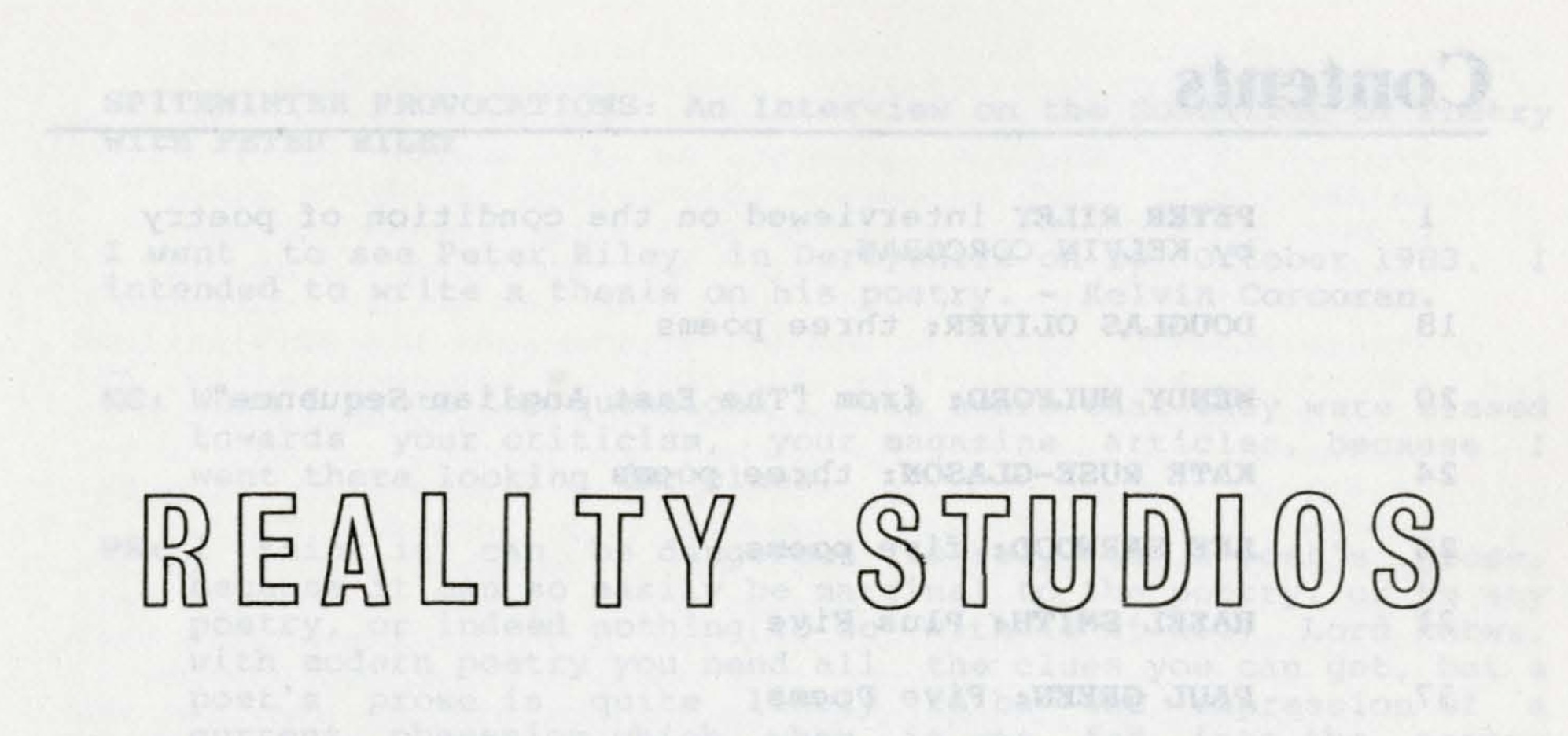 Jacket2 Reissues editor Danny Snelson is back with another amazing archival project. This time, it's Reality Studios, edited by Ken Edwards, which ran from 1978–1988. Here's how Snelson introduces the journal:
"Over the course of its ten-year span, Reality Studios introduced a vital new interface between the various permutations around the British Poetry Revival in the UK and emergent strands of Language writing in the US. Edited by Ken Edwards and published in London, the magazine followed Alembic (1973–78) and immediately preceded Edwards' Reality Street press, which continues publishing experimental poetry and prose to this day."
Full volumes are available for download or browsing, along with a ZIP file of the entire run. The index to each issue attempts to retain the formatting of the contents as printed in the magazine, including original pagination. Each PDF is fully searchable and bookmarked for easy navigation to individual pieces within the magazine.
Posted 2/19/2015 (link)
 Earlier this month, Bill Berkson visited the Kelly Writers House for a reading, and also stopped by Charles Bernstein's undergraduate seminar, where he recorded a two-part Close Listening program.
Unlike the typical Close Listening setup, with one reading segment and one conversation segment, this program consists of just two conversation segments, each running approximately thirty-five minutes — the first featuring Berkson and Bernstein in conversation, while for the second Berkson fields questions from Bernstein's students. Bernstein recently wrote-up the new show in a Jacket2 commentary post, which includes photos from the event (including the photo at left taken by Thomas Devaney) and this description of the show: "Bill Berkson discusses unprincipled poetry, vulgar beauty, the poetics of surface, the emergence of the New American Poetry, the trap of being too serious, and the possibilities of the unexpected."
Berkson's reading from the same day will be posted in the near future, but we didn't want to sit on this wonderful program any longer. You can listen to it, along with recordings going back to the early 1970s on PennSound's Bill Berkson author page.
Posted 2/24/2015 (link)
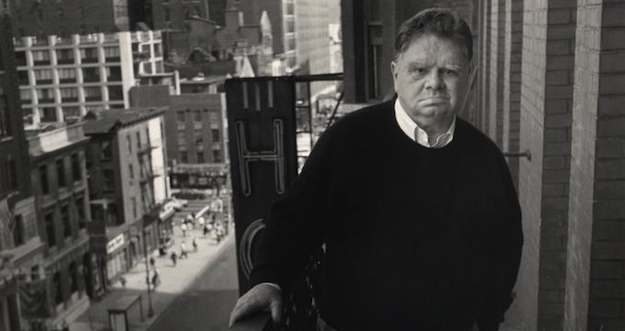 Today we released the eighty-fifth program in the PoemTalk Podcast series, which addresses James Schuyler's poem "February." For this program, host Al Filreis was joined by a panel of Bernadette Mayer, Julia Bloch, and Erica Kaufman.
Filreis' his write-up on the PoemTalk blog begins with some discussion of the poem and the recording's provenance — it's Schuyler's first public reading ever, a 1988 event at the Dia Art Foundation — then moves on to the panelists' initial impressions: "Bernadette is astonished by the emphatic use of color, feeling it almost to be a knowing rule or constraint, and she herself derived from admiration of this very poem several color-poem experiments of her own. Julia then catalogues the coloration of what is otherwise typically a drab time of year in New York. And Erica is delighted to assert that this is a 'New York poem.' 'Listening to him read,' Erica added, 'heightened my sense of one thing he does in his poems that I just love: the feeling you get that you're getting access to something that's pretty private. You're watching a private reading of his own space, but that space he's describing is also a space that's physical and somewhat public." You can read more about the program on Jacket2.
PoemTalk is a co-production of PennSound, the Kelly Writers House, Jacket2 and the Poetry Founddation. If you're interested in more information on the series or want to hear our archives of previous episodes, please visit the PoemTalk blog, and don't forget that you can subscribe to the series through the iTunes music store.
|
PennSound Daily archive
2023
2022
2021
2020
2019
2018
2017
2016
2015
2014
2013
2012
2011
2010
2009
2008
2007
|








